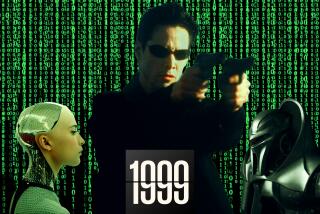Computer’s Power Is Not Just in What It Can Do for Us : LIFE ON THE SCREEN Identity in the Age of the Internet by Sherry Turkle. Simon & Schuster. $25, 347 pages
- Share via
Ihave a heretical confession to make: I find the Internet boring and a waste of time. Not the subject of the Internet. I mean the thing itself.
Mind you, I have been at this for a long time. I started writing about computers in 1977; I got my first personal computer in 1978 (a Radio Shack Model 1), and I have upgraded four or five times since. My current computer is one I built myself.
I have been online since the mid-’80s. Over the last few years, I have spent thousands of hours connected to the Net--reading newsgroups, downloading gigabytes of stuff, exploring Web sites.
My conclusion is that there is very little online that is worth the time and effort. The newsgroups and forums--supposedly the electronic town halls of the 1990s--are like talk radio: blah, blah, blah.
There are a few good nuggets in there somewhere, but the problem is that there is no quality control. Anybody with a computer and a modem can join in (that’s the whole idea, right?), but on screen, the good and the bad, the worthwhile and the worthless all look the same.
For the completely opposite view of the online world, we have “Life on the Screen” by Sherry Turkle, a professor of the sociology of science at the Massachusetts Institute of Technology, who has written knowledgeably and provocatively about computers, artificial intelligence and the computer culture for more than a decade.
In Turkle’s view, “Computers don’t just do things for us, they do things to us, including to our ways of thinking about ourselves and other people.”
She finds that MUDs and other interactive electronic communications stretch the frontiers of who we are and what it means to be sentient.
“A decade ago,” she writes, “the idea of machine intelligence provoked sharp debate. Today, the controversy about computers does not turn on their capacity for intelligence but on their capacity for life. We are willing to grant that the machine has a ‘psychology,’ but not that it can be alive.”
*
Frankly, I don’t know what she’s talking about. Computers do not have a psychology in any sense of the word “psychology” that I recognize. They are electromechanical boxes that do amazing things because they can perform millions of individual steps very quickly. But each individual step is a simple, discrete operation that has no more “psychology” than a flipped switch, which, after all, is what it is.
Put it all together and it’s still a bunch of flipped switches.
My sense of unease about Turkle’s book began in the first few pages, when she started talking about computers and postmodernism. “The computer is an actor in a struggle between modern and postmodern understandings,” she writes.
In our postmodernist, post-structuralist, post-industrial, post-everything age, logical, rational thought is considered passe, the silly leftover of modernism and the Enlightenment. “We are moving from a modernist culture of calculation toward a postmodernist culture of simulation,” Turkle says.
She tells us that IBM computers using the MS-DOS operating system are modernist--logical, rigid and reductionist--while the Apple Macintosh is postmodernist.
“With the introduction of Microsoft Windows in 1985,” she adds, “the modern and postmodern aesthetics of computing became curiously entwined.”
You will probably not be surprised to hear that in Turkle’s view, MS-DOS machines are masculine, while Macs embody the feminine way of knowing, not abstract and hierarchical but soft and communitarian.
“Through the mid-1980s,” she says, “a male-dominated computer culture that took one style as the right and only way to program discriminated against soft approaches.”
Turkle wants to brush all that aside. She regrets “the elite status of abstract thinking in Western thought,” and wants to substitute a different way of knowing. She champions what the French anthropologist Claude Levi-Strauss called bricolage--intellectual tinkering.
“The postmodern is a world without depth, a world of surface,” she says. “If there is no underlying meaning, or a meaning we shall never know, postmodern theorists argue that the privileged way of knowing can only be through an exploration of surfaces.”
Many people claim to find this sort of thing profound, but to me it sounds like gibberish. The Age of Reason in Western thought has accomplished marvelous things, while postmodernism has accomplished nothing.
But then again, I find most of what’s on the Internet gibberish, too.






